Today, Memory - the lady that comics built - explains the mysteries of the Hugo's Best Graphic Story category, and reveals ten award eligible comics she loves.
My name is Memory and I'm a vocal comics-lover.
This being the case, Jodie invited me to come by this week and talk to y’all about the Best Graphic Story category at the Hugo Awards. I want to say a bit about what qualifies for the award, how you (yes, you!) can nominate your favourite comics, and which 2014 releases I particularly recommend you check out.
What Qualifies For Best Graphic Story?
Graphic Story can be a confusing category because so many of its potential nominees are published in serial form. Traditional publishers like Marvel, DC, and Image usually release comics on a monthly basis and collect all the relevant issues into a unified edition anywhere from a couple of weeks to half a year after each story arc ends. Webcomics often release two or three pages per week, and collected editions can take as long as a year or two to appear depending on whether the creator(s) self publish or secure a book deal.
The basic rule for eligibility is that if the final/most recent instalment of a serial work appeared in English in any form during the relevant calendar year, that work is eligible for a Hugo. So if the last (or most recent) issue of your favourite story arc hit stands between January and December of 2014, it’s eligible; however, if the last issue came out in November 2013 and the collected edition was released in February 2014, it isn’t. You’re still welcome to nominate it, but it’s liable to be a wasted nomination1.
You can also nominate any single issue that first appeared in 2014; a good option for one-shots and standout issues buried in otherwise dodgy storylines.
ComiXology is a great place to discover both which issues comprise which collected editions and when they were released. For example, a quick comiXology search reveals that Saga Volume 3 contains issues 13-18. #18 came out on January 29th, 2014, so the entire arc is eligible, even though the previous issues came out in 2013; however, you couldn’t nominate issues 13-17 as single issues.
Similarly, the webcomic Nimona wrapped up in October 2014 and so is eligible in its entirety even though many of the pages were published throughout 2012 and 2013. The collected edition of Nimona drops in May 2015 and won’t be eligible for next year’s Hugos because the work was complete and available in digital form prior to this year. (That’s also what’s going to keep The Martian, Andy Weir’s much-lauded debut novel, off the ballot. Alas, availability is more important than wide/print distribution.)
You can nominate works in progress, but my own strong preference is to stick to complete story arcs with comics originally released by issue. Webcomics are another matter I tackle on a case-by-case basis; i.e., with my gut, not with my head.
So, yeah. Eligibility isn’t always clear cut. You’ll want to do some digging and verify your choices before you submit your nominations.
How Do I Nominate?
If you purchased a Sasquan membership prior to January 31st, you're a member of MidAmeriCon II, or if you were a member of LonCon3, you can submit your nominations at any point prior to 11:59pm, PDT, on March 10th. If you’re not already a member, I’m afraid you’ll have to wait until next year to nominate, though you’ll still be able to vote on the final ballot if you buy a membership now. Convention membership usually includes a digital packet of nominated works to help you make your final decisions, though this packet is not guaranteed.
If you’re a voting member and you haven’t yet received your PIN, you can request it here.
In most instances, you want to nominate your favourite story arc, trade collection, or individual issue rather than your favourite series by title. Last year’s final ballot details indicate it’s a good idea to structure your nomination as follows:
[Series Title] [Volume Number]: [Story Arc Title] by [Writer and Artist(s)]
If your chosen work lacks any of the above elements (for example, if you're nominating an original graphic novel that doesn't have a series title or volume number, or a collected edition that doesn't have an arc title), you'll want to leave out any of the bits that don't apply.
Remember, every comics artist who produced work in 2014 is also eligible for the Best Professional Artist category. You can simply nominate them by name.
Some 2014 Comics I Loved
Okay. You want to fill your Best Graphic Story ballot to the brim, but you maybe haven’t read so many 2014 comics, or your mind goes blank when someone asks you to identify a handful of the awesome titles published last year, or you’re just generally eager to hear what someone else loved and is considering for their ballot.
I’m here to help.
Here are ten 2014 comics I loved and think you should check out if you’re floundering for Best Graphic Story picks. The list is non-exhaustive, of course; a lot of great comics came out last year, and my comics reading is largely limited to what my library buys and what’s available on Marvel Unlimited. The titles listed below are particular favourites, though; things that blew me away and/or got me really, really excited for what’s coming next for each series.
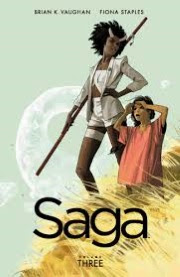
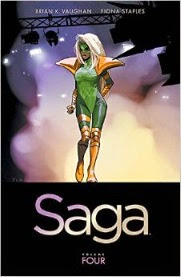
Saga Volume 3 and Saga Volume Four by Brian K. Vaughan and Fiona Staples [Goodreads – Vol 3; Vol 4] [comiXology - Vol 3; Vol 4]
For my money, Saga is the best comic on the market. It’s a sprawling yet personal sci fi epic about two former soldiers from opposite sides of a pan galactic conflict. They shack up, have a kid, and do their best to evade the forces tasked with tracking them down, all while dealing with the usual issues that arise within young families. The art is fantastic, the dialogue is superb, and the plot is impossible to discount. Vaughan and Staples pepper their work with so much subtle foreshadowing, and so many red herrings, that it’s as nerve-wracking to read as it is delightful.
Assuming you find having your heart ripped out and stomped on delightful. Maybe that ain’t so much your thing.
Volume 3 and Volume 4 are both eligible this year. Volume 3 wrapped up in January 2014 with issue #18; Volume 4 ended in October 2014 with issue #24. The story is cumulative, so you’ll want to read Volumes 1 and 2 first.
If you read with an eye for ethnic, geographic, and gender diversity, be aware that Vaughan is a white American man and Staples is a Canadian woman of colour.
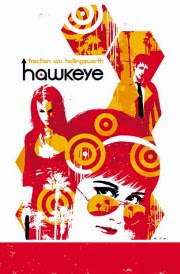
Hawkeye Volume 3: L.A. Woman by Matt Fraction, Annie Wu, and Javier Pullido [Goodreads] [comiXology]
Kate Bishop (the younger, female Hawkeye; also, the light of my heart, the breath in my lungs) lights out for L.A., attracts the enmity of Madame Masque, loses all her money, becomes a private detective, and does heaps of awesome shit with her trusty sidekick, Pizza Dog, in tow. It's frickin' amazing.
I mean, yeah, there are a couple of reviews floating around the Internet that are basically like, "How the hell did this shit get published?" but I’m inclined to dismiss those as having come from people who aren’t into stories about awesome women doing awesome things. Because how else can you fail to love Kate Bishop rushing around solving mysteries, buying weird cat food, and reminding people she’s pretty well an Avenger?
(Yeah, I know; "individual tastes" and all that.)
The arc wrapped up with issue #20 in September 2014, so it’s eligible. Alas, the series other 2014 arc, Rio Bravo, hasn’t yet ended, but you can bet we’ll talk about it next year. Okay?
L.A. Woman can probably stand alone, but I suspect you’ll enjoy it more if you’ve read the first two volumes.
Diversity notes: Fraction is a white American man, Wu is an American woman of colour, and Pullido is a white Spanish man.
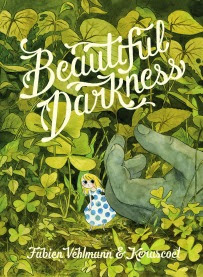
Beautiful Darkness by Fabien Vehlmann and Kerascoet; translated by Helge Dascher [Goodreads]
I don’t want to tell you too much about Beautiful Darkness lest I ruin its many surprises but the basic premise is this: a multitude of tiny people take up residence in a forest after their world is destroyed. Their princess, Aurora, tries to provide for everyone and maintain some semblance of order, but it soon becomes clear the rest of the lot are determined to experience their strange new home with an eye to their own pleasures, heedless of what their community actually needs.
It’s horrifying, but it’s also excellent.
BEAUTIFUL DARKNESS was originally published in French. The English translation appeared in February 2014. It’s a standalone.
Diversity notes: Vehlmann is a white French man. Kerascoët is an artist's studio comprised of a white French man and a white French woman.

The Wicked + The Divine Volume One: The Faust Act by Kieron Gillen and Jamie McKelvie [Goodreads] [comiXology]
I’m rather bummed Young Avengers Volume 2: Alternative Culture isn’t eligible for this year’s awards, so I shall console myself by recommending Gillen and McKelvie’s equally excellent, creator-owned title.
The facts are these: every ninety years, twelve gods possess the bodies of twelve young mortals. For the next two years, they make huge waves as pop stars and deeply controversial figures, which allows them to soak up a hell of a lot of worship. After that, they die.
Laura, a teenage Londoner and devout believer, is drawn into the gods’ inner circle when she sets out to help Lucifer clear herself of a false (?) murder charge. The result is a wild, morally dubious tale in which women team up to help women by consulting other women. I loved the hell out of it.
Also, pretty well all the important characters are queer and/or POC. Hurray!
The first arc ended in October 2014 with issue #5.
Diversity notes: Gillen and McKelvie are both white British men.
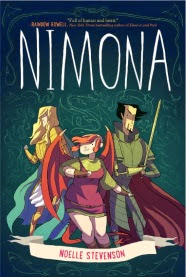
Nimona by Noelle Stevenson [Goodreads] [Website]
This webcomic, y’all. I broke my only-complete-story-arcs rule and nominated it last year, but alas, it didn’t make the final ballot. I’m hoping it’s got a better shot now it’s wrapped up.
The story follows Nimona, a young shapeshifter who decides she has a bright future as sidekick to Ballister Blackheart, noted hero-turned-villainous-scientist. She weasels her way into Ballister’s life and proceeds to fuck up as much shit as she possibly can before the dastardly Institution of Law Enforcement and Heroics takes her down. It’s hilarious, but it’s also heartbreaking and painful and deeply concerned with the systems that tell us what qualifies as good or evil. My brain turns into a great big line of exclamation points whenever I think of it, like so:
I wrote a fairly detailed thing about Nimona during Lady Business's Super Women & Comics theme week, if you're into really long essays on ladies in comics.
The final page was posted in October 2014 (or maybe it was early November. I’m bad with time and there’s no date stamp on the post). It’s a standalone that’s still available to read for free online, so you should get on that.
Diversity notes: Stevenson is a white American woman.

Ms Marvel Volume One: No Normal by G. Willow Wilson and Adrian Alphona [Goodreads] [comiXology]
If Twitter is anything to go by, Ms Marvel is the comic on everyone’s mind. It’s certainly an important work, dealing as it does with the first (or possibly just first mainstream?) Muslim-American superhero. And on top of that, it’s downright enjoyable on every level.
Kamala Khan is desperate to balance her life as a contemporary teenager with the dictates of her culture, and her task only gets harder when she gains the ability to reshape her body on a molecular level. She’s determined to live up to the example her hero, Carol Danvers (aka Captain Marvel), has set, but fighting crime isn’t nearly as easy as the Avengers make it look. Especially when you have super-protective parents.
The first arc wrapped up in June 2014 with issue #5.
Diversity notes: Wilson is a white American woman who’s also lived overseas in Egypt and is a prominent Muslim creator. Alphona is a Canadian man of colour.

Sex Criminals Volume One: One Weird Trick by Matt Fraction and Chip Zdarsky [Goodreads] [comiXology]
Sex Criminals is not about what you think it's about.
Suzie believes she’s the only one who can stop time with her orgasms, but then she meets John. United by their peculiar gift, they set out to rob a few banks--purely to save the failing library where Suzie works, of course. But what initially seems like a destined match soon begins to falter due to their differing goals, not to mention the sextime cops who’ve caught on to their scheme.
Turns out, using your orgasms to rob banks is illegal. I’m as shocked as you are.
There’s plenty of humour, some darker undertones that look set to explode in the next volume, and an excellent scene where Suzie sings Queen’s “Fat Bottomed Girls” without any of the lyrics because the creators couldn’t secure licensing rights.
The first arc ended in March 2014 with issue #5.
Diversity notes: Fraction is a white American man. Zdarsky is a white Canadian man.
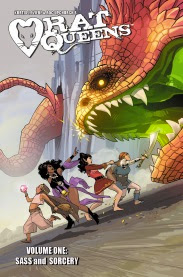
Rat Queens Volume One: Sass and Sorcery by Kurtis J. Wiebe and Roc Upchurch. [Goodreads] [comiXology]
Rat Queens has much in common with the sort of RPG-inspired fantasy I devoured in the late 90s. Wiebe and Upchurch introduce us to an Elven spellcaster, a Dwarven fighter, a human cleric, and a Smidgen (think hobbit/halfling) thief who’ve come together to fight monsters and amass a big-ass pile of treasure while they’re at it--but they’re not all hetero, the non-white team members aren’t automatically presumed to be evil, and none of them is male.
There’s also a fuckton of profanity and quite a lot of drug use. It’s the secondary world fantasy comic I never quite dared to want.
This opening arc wrapped up in February 2014 with issue #5.
Diversity notes: Wiebe is a white Canadian man. Upchurch is an American man of colour.
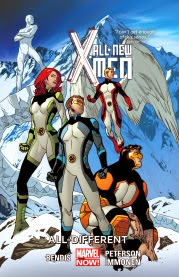
All-New X-Men Volume Four: All Different by Brian Michael Bendis, Brandon Peterson, Mahmud Asrar, and Stuart Immonen [Goodreads] [comiXology]
Okay, so I’m not seriously recommending you nominate this ones for a Hugo, but I’ve gotta give it a shout-out because the series as a whole is the funnest comic I’ve read since I discovered Nimona last February. Plus I figure you’re gonna need a palate cleanser after the emotional wreckage that is Beautiful Darkness or Saga Volume Four.
Or maybe I just want an excuse to gush.
The premise: Current-Beast has brought the five original X-Men (Jean Grey, Cyclops, Beast, Iceman, and Angel) into the present to talk some sense into current-Cyclops, who’s become a mutant revolutionary. They’re supposed to make a running visit, then zip on back and have their memories wiped so it’s like it never happened, but you know everything goes wrong and they get stuck in the present.
And it’s awesome. Time travel shenanigans are my favourite, and I’ve had a blast watching these five mostly untrained kids figure out the future. I want you to have this experience, too.
Start with the first volume, though. Don’t jump in here.
If you do end up reading with an eye for awards eligibility, the fourth arc arc wrapped up in January 2014 with issue #21. The Trial of Jean Grey, a crossover with Guardians of the Galaxy, also ended in March 2014 with issue #24, while the fifth volume, One Down, concluded in July 2014 with issue #29.
Diversity notes: Bendis, Peterson, and Immonen are white American men. Asrar is a Turkish man of colour.
Further Reading
While I haven’t yet been able to read the following comics, I’ve heard great things about them and urge you to check them out prior to the nomination deadline if you possibly can:
- Captain Marvel Volume One: Higher, Further, Faster, More by Kelly Sue DeConnick and David Lopez [Goodreads] [comiXology]
- Pretty Deadly Volume One by Kelly Sue DeConnick and Emma Rios [Goodreads] [comiXology]
- Avatar: The Last Airbender: The Rift, parts 1-3 by Gene Luen Yang and Gurihuru [Goodreads] [Dark Horse Digital]
- The Shadow Hero by Gene Luen Yang and Sonny Liew [Goodreads]
- Seconds by Bryan Lee O’Malley [Goodreads]
You’ll notice I’m totally clueless as to what’s going on with DC these days, so I’d love you to chime in with any recs in that area. My list is also sadly lacking in comics written and drawn solely by women, so you know what to do.
Unless--and this is where things get seriously confusing, which is why I’m sticking it in a footnote instead of clogging up the already bloated main post--the collected edition contains a copyright date of 2014. In that case, I suppose there’s a chance the awards committee could decide to accept that as the official publication date according to the guidelines they’ve set out in the Year of Eligibility section of the rules, though to my mind it contradicts what they’ve said in the Serialized Works section and/or the subheading that covers online publication.
Still, I thought I ought to mention it for the sticklers among you.
Other Lady Business Posts About the 2015 Hugo Awards
Guest Post: Forestofglory's Best Short Fiction of 2014
The Hugo Awards 2015: A Collection of Nominations
Our 'awards: hugo awards: eligible in 2015' tag
no subject
Date: 2015-02-12 11:24 am (UTC)no subject
Date: 2015-03-01 11:31 pm (UTC)